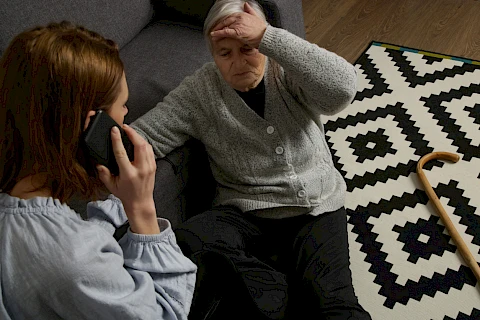
May is recognized nationally as Stroke Awareness Month. It's a critical time to highlight the signs of this potentially life-threatening event. As a caregiver for a senior, your role is to act with urgency and precision during emergencies, such as a stroke. We want to equip you with knowledge about the warning signs of a stroke and provide you with a clear action plan for responding to such a situation. Your swift recognition and response can make a significant difference in the treatment and recovery of a senior who might be experiencing a stroke.
What Is a Stroke?
A stroke occurs when the blood supply to part of the brain is blocked or when a blood vessel in the brain bursts. This can lead to severe health complications and even loss of life, especially in seniors who have other underlying health conditions. It is a common misconception that strokes only cause physical symptoms. The fact is, strokes can impact cognitive capabilities and emotional health as well.
Warning Signs of a Stroke
When it comes to identifying a stroke, timing is of the essence. Recognizing the warning signs can lead to quicker medical intervention, potentially reducing the long-term impact of the stroke on the senior's health. Some physical symptoms include sudden numbness or weakness of the face, arm, or leg, particularly on one side of the body. It's common to see sudden confusion or trouble speaking or understanding speech.
However, strokes can also trigger cognitive and emotional changes. Rapid and unexplained changes in mood or cognition may be an indicator of a stroke. Look for unusual difficulty with memory, awareness, attention, or confusion. If these symptoms are noticed, seek medical attention immediately.
Caregiver Action Plan
As a caregiver, your immediate response to a suspected stroke can make all the difference. The first step in such a situation is to dial 911 or your local emergency number. Tell the dispatcher that you suspect a stroke. Emergency services are trained to prioritize these calls and can prepare necessary interventions even before arrival.
While waiting for emergency services, your role is to comfort the senior. Ensure they are safe and comfortable and reassure them that help is coming. Do not give them any medication or food, as it may cause complications.
Upon arrival, the emergency services team will quickly evaluate the situation and transport the patient to a medical facility if necessary. At this point, your role transitions from emergency response to ongoing support. Have clear, ongoing communication with the medical team about the senior's medical history, medications, and other pertinent information.
In the recovery phase, caregiving becomes more intensive. You'll need to help manage the senior's medications, therapy schedules, and doctor's appointments. Emotional support is also crucial during this time, as getting through post-stroke recovery can be a challenging journey.
Do You Need Stroke Support at Home?
Stroke Awareness Month serves as a vital reminder of our role as caregivers in recognizing the signs of a stroke and responding promptly.
Senior Helpers of Richmond is here to assist if you're in Richmond, Mechanicsville, Henrico, or Sandston and require more support in caring for seniors. We offer a range of services tailored specifically to the needs of seniors and those who care for them, from daily assistance to post-stroke care and recovery support. Contact us to discuss how we can help you.